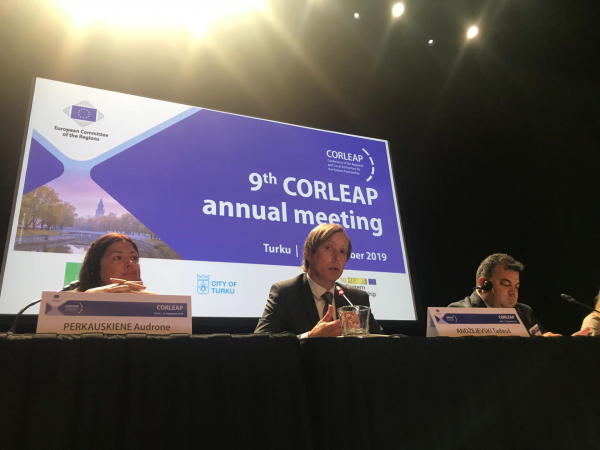Shaping the future of the Eastern Partnership

The European Committee of the Regions has appointed ECR Member Tadeusz Andrzejewski (Member of the Vilnius Municipal Council in Lithuania), as its spokesperson on ''Local and Regional Authorities shaping the future of the Eastern Partnership'' on June 25, 2019. The document prepared under the leadership of Mr Andrzejewski will help build momentum in securing the deserve acknowledgement of the role of local and regional authorities by heads of state or government at the next Eastern Partnership Summit in 2020.
This year marks the tenth anniversary of the Eastern Partnership, which presents an opportunity for the European Committee of the Regions to review the achievements made since 2009 and reflect on the future of the format. The Eastern Partnership is an initiative of the European Union for cooperation with six post-Soviet states – Ukraine, Belarus, Armenia, Azerbaijan, Moldova, Georgia as an Eastern dimension of the larger European Neighbourhood Policy.
The opinion drafted under the leadership of our Member from Vilnius will aim to address the following policy areas – economic development and resilience, good governance and rule of law, intra-regional cooperation and communication.
"I believe it is a good thing that at the end of the European Committee of the Regions' term-of-office, we will be able to revisit the subject of the Eastern Partnership policy, which Poland and Sweden launched ten years ago within the EU framework", said the rapporteur.
"In the opinion, I am preparing for the European Committee of the Regions, I want to pay particular attention to the issue of cross-border relations with the Eastern Partnership countries, as a representative of a country which gained experience of this issue when Lithuania aspired to join the EU".
The Eastern Partnership is facing two major challenges – political instability (the continuing crisis in Ukraine, the increasing polarization in Moldova and weakening government, violence between Armenia and Azerbaijan over the Nagorno-Karabakh) and Russian insistence on using armed conflict and political coercion on crucial sectors of EaP economies for political blackmail.
The ECR Group strongly supports the restoration of Ukraine's control over its whole territory. At the same time, we are in favour of giving a stronger role for local and regional authorities in the Eastern Partnership to help speed up their post-Soviet economic development and transition.
"I believe that regional cooperation along the border and its revival can give the Partnership a fresh impetus. It is also worth noting the dynamics of the political processes in the east of Europe described in the opinion. The EU cannot be a bystander in these processes if it wants to influence the development of democracy and the stability of the political systems in the countries in its eastern periphery", said Mr Andrzejewski.
The opinion was debated for the first time in the Conference of Local and Regional Authorities for the Eastern Partnership (CORLEAP) meeting in September in Turku, Finland. Mr Andrzejewski will also have the opportunity to present it at the external meeting of the CoR's Commission on Citizenship, Governance, Institutional & External Affairs (CIVEX) on 7-8 November. The position paper will be adopted by the CoR during its December plenary session on 4-5 December.

